20春福师《学前儿童科学教育》在线作业一答案45722
福师《学前儿童科学教育》在线作业 参考资料

学前儿童科学教育1 单选题1 在观察前依据所需观察的目标制定观察核对表,调查者根据观察到的事件或行为,对照表中的各项目逐条检核,并在符合的条目上做出记号并进行评定的是 BA 观察核对B 行为核对C 观察评价D 行为评价2 维持儿童科学探索过程的动力是()。
DA 充足的物质材料B 自然环境C 心理环境D 良好的心理环境3 学前儿童正规性科学活动 BA 与其他类型完全不同的活动B 是儿童自己主动的学习活动C 儿童可自主选择学习材料的科学活动D 可自选活动时间4 下列不属于学前儿童科学教育环境的要素的是()。
BA 自然环境B 社会环境C 心理环境D 物质材料5 科学游戏旨在 AA 重复游戏中所伴随的科学现象B 探索科学现象之间的关系或解决问题C 获得新发现,掌握新知识D 通过游戏体现问题、任务或目的6 把一堆物品放在一起进行分类:黄瓜、罗卜都是蔬菜,苹果、红枣、梨都不是蔬菜,这是 BA 挑选分类B 二元分类C 感知分类D 多元分类7 “做中学”科学教育项目起源于 BA 法国B 美国C 中国D 德国8 科学教育的最终目的是()。
CA 获取丰富的科学经验B 培养对科学的好奇心C 培养儿童真善美的完美个性D 培养学科学的方法9 对于学前儿童来说,他们的科学知识有两个层次,即: AA 科学经验和初级科学概念B 感性的知识和理性的知识C 初级经验和高级经验D 具体的经验和抽象的经验10 作为学前儿童科学教育目标的一个方面,能体现学前儿童科学教育特殊性的是 BA 方法方面的目标B 知识方面的目标C 情感个性方面的目标D 技能方面的目标11 以下物品中可以作为学前儿童自然测量工具的是 AA 绳子B 秤C 直尺D 钟表12 下列都可供儿童进行科学探索的一组材料是()。
CA 锤子、尺、纸盒、纸杯、饮料瓶等B 气味瓶、让儿童通过触摸分辨物体的“魔箱”C 各种形状和大小的磁铁、指南针、三棱镜、手电筒、滑轮等D 儿童自己收集的树叶、种子、动物、骨骼、昆虫世界、无土栽培的植物等13 家庭儿童科学教育具有以下明显的特点 AA 个别性、随机性、灵活性、潜移默化性B 个别性、潜移默化性、开放性、灵活性C 亲密性、开放性、潜移默化性、灵活性D 潜移默化性、联系性、随机性、灵活性14 渗透的学前儿童科学教育活动包括 DA 日常生活中的科学教育、游戏活动中的科学教育、偶发性的科学教育B 集体性的科学教育、游戏活动中的科学教育、其它教育活动中的科学教育C 日常生活中的科学教育、偶发性的科学教育、其它教育活动中的科学教育D 日常生活中的科学教育、游戏活动中的科学教育、其它教育活动中的科学教育15 下列不属于学前儿童可以进行测量的内容的是 AA 在地图上测量两个城市的距离B 用天平称物体的重量C 用目测感知物体的大小、长短、粗细等D 测量动植物生长过程中的各个主要阶段16 学前儿童正规性科学活动: BA 与其他类型完全不同的活动B 是儿童自己主动的学习活动C 儿童可自主选择学习材料的科学活动D 可自选活动时间17 属于“人造”的自然,是科学技术应用于社会生活的体现的是; CA 水、阳光、空气等B 木、石、土等C 电脑、飞机、电脑、汽车等D 鸡、鸭、羊、狗等18 在正规性科学活动结束时,设计要充分体现: DA 互动性B 封闭性C 自主性D 开放性19 幼儿爱向成人提出各种有关自然界的问题,他们问“月亮为什么是圆的?”,这类问题属于 CA 简朴性问题B 操作性问题C 理论性问题D 直白性问题20 下列不属于评价幼儿科学探究能力的是:() AA 求实与批判精神B 记录和统计有关的信息C 发现关系的能力D 探究的倾向性和深度2 多选题1 正规性科学活动的设计包括: A B C DA 活动课题的设计B 活动目标的设计C 活动材料的设计D 活动过程的设计2 幼儿表达技能的目标主要包括: A B CA 学习用准确、有效的语言自己在科学活动中的做法B 学会用适当的方式表达自己在科学活动中的情绪体验C 学习用各种手段展示自己的科学活动结果D 学习用对的方法表达自己的意见3 幼儿科学教育中操作技能的目标包括: A B C DA 学会使用简单工具的技能;B 学习使用工具制作简单产品的技能;C 培养在操作过程中根据操作目标及时调整操作过程的能力;D 培养对操作过程和结果的思考、调整和修正的能力4 正规性科学活动的指导应做到: A B C DA 观察、分析儿童的行为B 适当参与儿童的活动C 保证儿童的活动机会D 合理运用评价的手段5 幼儿学科学的要素包括: A B C DA 探索态度B 探索对象C 探索过程D 探索结果6 正规性科学活动的作用是: A B DA 保证每个儿童掌握基本的科学知识和方法技能B 教师的直接指导提高了儿童的学习效率C 教师的间接指导提高了儿童的学习效率D 集体教学的形式可以使儿童和同伴相互交流、相互启发、相互学习7 在教育实践中,幼儿科学教育内容的科学性和启蒙性应体现在: A C DA 选择儿童可以直接探索的内容B 结合儿童的生活向儿童介绍现代的先进科学技术C 让儿童通过自己直接的探索活动D 选择儿童可以理解的内容8 幼儿科学教育情感目标要包括以下几个方面: A B CA 鼓励幼儿对于自然和科学现象有好奇心B 启发幼儿热爱自然,爱护环境C 培养儿童对科学技术及其对社会的作用的关注D 完善儿童的知识体系9 正规性科学活动的特点是 A B C DA 学习内容统一、固定,由教师选择B 学习材料由教师统一提供,所有儿童共同操作C 学习过程中教师的直接指导较多,时间和空间受限制D 学习的形式以集体教学为主10 《幼儿园教育指导纲要(试行)》,中明确阐述了幼儿科学教育的总目标包括: A B C DA 能运用各种感官,动手动脑,探究问题B 能用适当的方式表达、交流探索的过程和结果C 对周围的事物、现象感兴趣,有好奇心和求知欲D 珍惜自然资源,有初步的环保意识3 判断题1 观察是一种无目的的知觉活动,同时也是一种基本的科学方法 AA 错误B 正确2 科学技术的功能包括认识功能、生产力功能 BA 错误B 正确3 我国的儿童科学教育通过专门设置的自然课程进行,是在清代嘉庆年间。
学前儿童科学教育作业答案
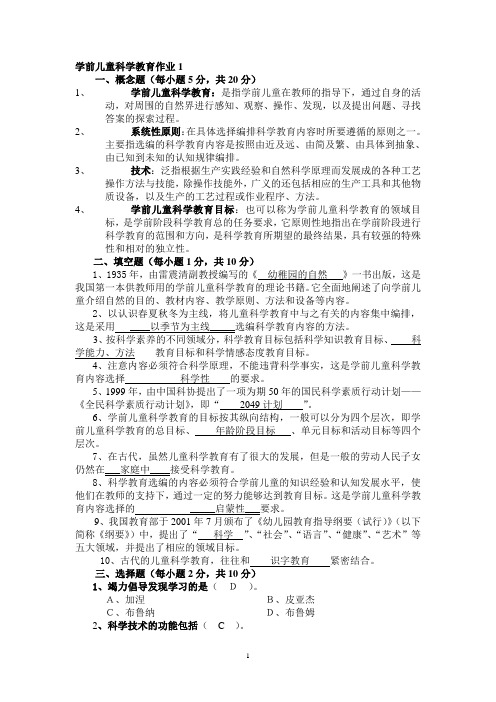
学前儿童科学教育作业1一、概念题(每小题5分,共20分)1、学前儿童科学教育:是指学前儿童在教师的指导下,通过自身的活动,对周围的自然界进行感知、观察、操作、发现,以及提出问题、寻找答案的探索过程。
2、系统性原则:在具体选择编排科学教育内容时所要遵循的原则之一。
主要指选编的科学教育内容是按照由近及远、由简及繁、由具体到抽象、由已知到未知的认知规律编排。
3、技术:泛指根据生产实践经验和自然科学原理而发展成的各种工艺操作方法与技能,除操作技能外,广义的还包括相应的生产工具和其他物质设备,以及生产的工艺过程或作业程序、方法。
4、学前儿童科学教育目标:也可以称为学前儿童科学教育的领域目标,是学前阶段科学教育总的任务要求,它原则性地指出在学前阶段进行科学教育的范围和方向,是科学教育所期望的最终结果,具有较强的特殊性和相对的独立性。
二、填空题(每小题1分,共10分)1、1935年,由雷震清副教授编写的《幼稚园的自然》一书出版,这是我国第一本供教师用的学前儿童科学教育的理论书籍。
它全面地阐述了向学前儿童介绍自然的目的、教材内容、教学原则、方法和设备等内容。
2、以认识春夏秋冬为主线,将儿童科学教育中与之有关的内容集中编排,这是采用 ____以季节为主线_____选编科学教育内容的方法。
3、按科学素养的不同领域分,科学教育目标包括科学知识教育目标、科学能力、方法____教育目标和科学情感态度教育目标。
4、注意内容必须符合科学原理,不能违背科学事实,这是学前儿童科学教育内容选择____科学性____的要求。
5、1999年,由中国科协提出了一项为期50年的国民科学素质行动计划——《全民科学素质行动计划》,即“2049计划”。
6、学前儿童科学教育的目标按其纵向结构,一般可以分为四个层次,即学前儿童科学教育的总目标、年龄阶段目标、单元目标和活动目标等四个层次。
7、在古代,虽然儿童科学教育有了很大的发展,但是一般的劳动人民子女仍然在___家庭中____接受科学教育。
20春【福建师范】《小学科学教育》在线作业一(答案资料)
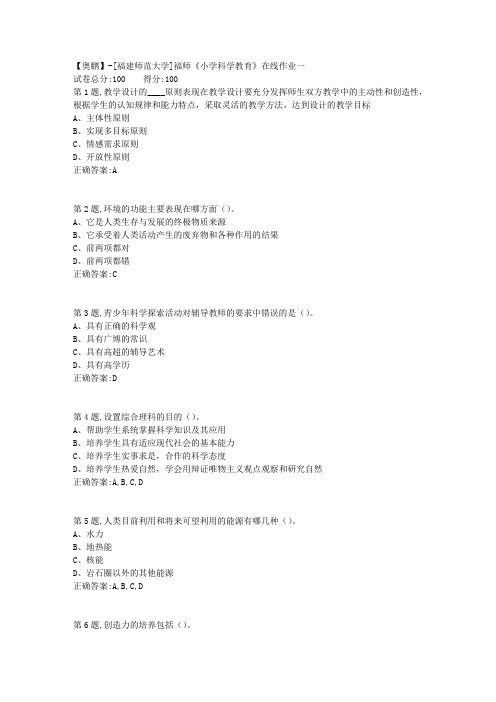
【奥鹏】-[福建师范大学]福师《小学科学教育》在线作业一试卷总分:100 得分:100第1题,教学设计的____原则表现在教学设计要充分发挥师生双方教学中的主动性和创造性,根据学生的认知规律和能力特点,采取灵活的教学方法,达到设计的教学目标A、主体性原则B、实现多目标原则C、情感需求原则D、开放性原则正确答案:A第2题,环境的功能主要表现在哪方面()。
A、它是人类生存与发展的终极物质来源B、它承受着人类活动产生的废弃物和各种作用的结果C、前两项都对D、前两项都错正确答案:C第3题,青少年科学探索活动对辅导教师的要求中错误的是()。
A、具有正确的科学观B、具有广博的常识C、具有高超的辅导艺术D、具有高学历正确答案:D第4题,设置综合理科的目的()。
A、帮助学生系统掌握科学知识及其应用B、培养学生具有适应现代社会的基本能力C、培养学生实事求是,合作的科学态度D、培养学生热爱自然,学会用辩证唯物主义观点观察和研究自然正确答案:A,B,C,D第5题,人类目前利用和将来可望利用的能源有哪几种()。
A、水力B、地热能C、核能D、岩石圈以外的其他能源正确答案:A,B,C,D第6题,创造力的培养包括()。
A、激发创造动机B、培养创造的敏感性C、训练创造的思路D、培养创造的胆识和胆略正确答案:A,B,C,D第7题,问题教学法的教学步骤包括____。
A、选择问题B、明确问题C、在问题情境中寻找线索D、解决问题E、检验答案正确答案:A,B,C,D,E第8题,创造力的培养包括____。
A、激发创造动机B、培养创造的敏感性C、训练创造的思路D、培养创造的胆识和胆略正确答案:A,B,C,D第9题,观察能力是对事物间接的,概括的认知能力。
A、错误B、正确正确答案:A第10题,实验探索法强调从“做中学”,力图通过学生“做”的主动探究过程来培养学生的创新精神、动手能力和解决实际问题的能力。
A、错误B、正确正确答案:A第11题,设计科技活动方案的第一步是确立科技活动的目标。
2020年春季《学前儿童科学教育》在线作业一标准答案

B.都有固定的场所
C.都是儿童主动地选择材料
D.都需要教师的直接指导
正确答案:A
3.下例动物中,适合学前儿童饲养的是
A.乌龟、金鱼、娇凤、蝌蚪
B.乌龟、金鱼、蝌蚪、蚕
C.蛇、金鱼、泥鳅、蝌蚪
D.乌龟、甲鱼、娇凤、蚕
正确答案:B
4.关于非正规性科学活动的作用说法正确的是:
D.通过游戏体现问题、任务或目的
正确答案:A
20.学前儿童正规性科学活动
A.与其他类型完全不同的活动
B.是儿童自己主动的学习活动
C.儿童可自主选择学习材料的科学活动
D.可自选活动时间
正确答案:B
二、 多选题 (共 10 道试题,共 20 分)
1.幼儿表达技能的目标主要包括:
D.自然测量法
正确答案:A
10.在儿童学科学的诸要素中,幼儿学科学的物质前提是
A.探索态度
B.探索对象
C.探索过程
D.探索来测量物体,这种测量方式是
A.普通测量
B.观察测量
C.正式量具测量
D.非正式量具测量
正确答案:B
C.使幼儿获得有关周围物质世界及其关系的感性认识和经验的过程。
D.支持幼儿亲身探究解决问题策略的过程
正确答案:ABCD
3.幼儿科学教育内容选择的首要要求是:
A.科学性
B.广泛性
C.时代性
D.启蒙性
正确答案:AD
4.在教育实践中,幼儿科学教育内容的科学性和启蒙性应体现在:
A.选择儿童可以直接探索的内容
A.能充分顾及儿童在能力和兴趣等方面的个别差异
福建师范大学2020春季《小学科学教育》在线作业试题及满分答案
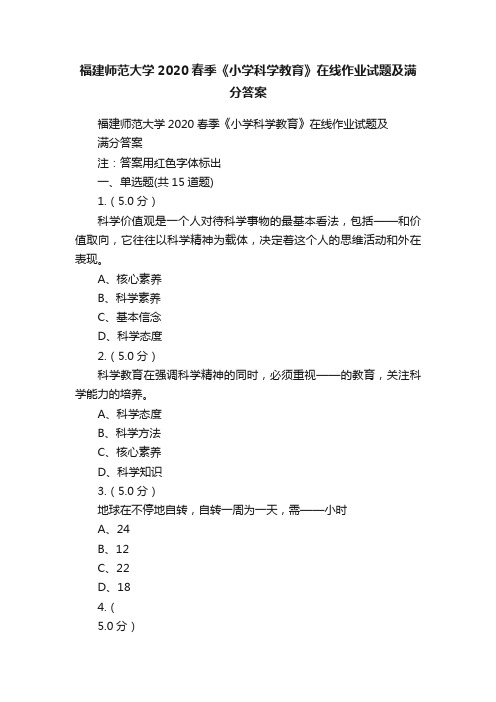
福建师范大学2020春季《小学科学教育》在线作业试题及满分答案福建师范大学2020春季《小学科学教育》在线作业试题及满分答案注:答案用红色字体标出一、单选题(共15道题)1.(5.0分)科学价值观是一个人对待科学事物的最基本看法,包括——和价值取向,它往往以科学精神为载体,决定着这个人的思维活动和外在表现。
A、核心素养B、科学素养C、基本信念D、科学态度2.(5.0分)科学教育在强调科学精神的同时,必须重视——的教育,关注科学能力的培养。
A、科学态度B、科学方法C、核心素养D、科学知识3.(5.0分)地球在不停地自转,自转一周为一天,需——小时A、24B、12C、22D、184.(5.0分)小学科学知识内容包括:——、物质世界及地球与宇宙三个部分。
A、科学与技术B、化学C、生命世界D、地理5.(5.0分)教学目标编制要把握四个基本的要素:行为主体、——、行为条件和表现程度。
A、课程标准B、行为动词C、学生特点D、教学策略6.(5.0分)人的认知结构的主观部分可分为知识结构、——、价值规范结构三个方面。
A、方法结构B、技术结构C、能力结构D、系统结构7.(5.0分)小学科学教育的基本理念:科学课程要面向——。
A、全体学生B、社会大众C、对科学有兴趣的学生D、未来科学家8.(5.0分)身高和体重是青少年——的重要指标,是体格健康检查的常规项目。
A、生长发育B、生理疾病预防C、心理行为发育D、系统发育9.(5.0分)科学教育具有客观性、——、实践性、准确性、进取性几个基本特征。
A、可行性B、挑战性C、理智性D、适应性10.(5.0分)地球内部有炽热的——。
A、地壳B、地幔C、地壳D、岩浆11.(5.0分)科学课程资源按科学课程资源的空间分布特点可以分为学校课程资源、——和社区课程资源。
A、科普读物B、电视媒体C、课外书籍D、家庭课程资源12.(5.0分)探究研讨法在教学组织形式上由“——”和“研讨”两个基本环节构成。
学前儿童科学教育作业1答案(Preschoolchildren
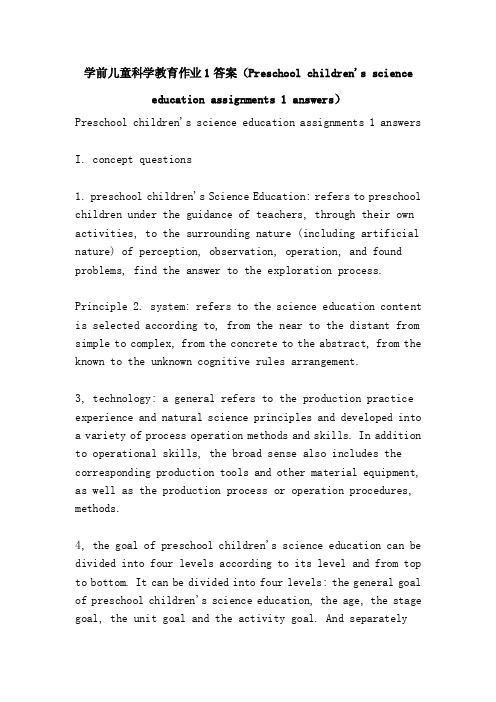
学前儿童科学教育作业1答案(Preschool children's science education assignments 1 answers)Preschool children's science education assignments 1 answersI. concept questions1. preschool children's Science Education: refers to preschool children under the guidance of teachers, through their own activities, to the surrounding nature (including artificial nature) of perception, observation, operation, and found problems, find the answer to the exploration process.Principle 2. system: refers to the science education content is selected according to, from the near to the distant from simple to complex, from the concrete to the abstract, from the known to the unknown cognitive rules arrangement.3, technology: a general refers to the production practice experience and natural science principles and developed into a variety of process operation methods and skills. In addition to operational skills, the broad sense also includes the corresponding production tools and other material equipment, as well as the production process or operation procedures, methods.4, the goal of preschool children's science education can be divided into four levels according to its level and from top to bottom. It can be divided into four levels: the general goal of preschool children's science education, the age, the stage goal, the unit goal and the activity goal. And separatelyelaborate the total goal, age, stage goal, unit goal and activity goal and so on.Two, 1., the nature of kindergarten 2., the season as the main line, 3, science and ability, methods 4, scientific 5, 2049 plan 6, age target 7, family 8 enlightenment 9 science 10 literacy educationThree, 1, C 2, C 3, B 4, B 5, CFour, 1, the difference and relation between scientific experience and scientific concept?Scientific experience refers to the preschool children in scientific exploration activities, by personally operate their direct contact with the world around, their sense organs, to obtain the specific facts and first-hand experience, the experience is relevant because of the nature of things and phenomena, so it is named as scientific experience.Scientific concept is the understanding of the essence and abstraction of things, and the result of generalization of concrete things.There are differences between scientific experience and scientific concept, but they are closely related. The formation of scientific concepts depends on the acquisition of scientific experience, and the scientific experience influences the acquisition of the primary scientific connotation.What is the 2 preschool children science education contentselection principle?Preschool Science education content selection mainly has the following six basic principles:(1) scientific: the content chosen must be in accordance with scientific principles.(2) the Enlightenment: refers to the selected content must comply with the knowledge and cognitive level of preschool children, pre-school children with the help of the teachers, through efforts to achieve educational goals, namely, to understand and accept.(3): refers to the systematic science education content is selected according to, from the near to the distant from simple to complex, with the concrete to the abstract, from the known to the unknown law arrangement.(4) according to the requirements of the times: refers to the development of the times, the progress of science and technology, to the selection of science education, the selection of the content to keep pace with the time and for the modernization of science and technology.(5) local: local requirement means to contact the local natural environment and cultural background.(6) the seasonal seasonal demand refers to seasonal changes to contact the selection of science education content.3, what are the bases for determining the goals of preschool children's science education?(1) the psychological basis for the purpose of preschool children's scientific education;(2) to determine the social basis for the goals of preschool children's science education;(3) to determine the disciplinary basis of preschool children's scientific education goals.4, illustrate the selection of science education content of the local and seasonal principles.Where the principle of selection of science education content: refers to the local requirements should contact the local natural environment and cultural background, to compile the contents of scientific education. In accordance with local requirements, the contents of science education should be chosen according to the local natural characteristicsThe seasonal selection principle of Science Education: the principle of selection of seasonal science education content, which can enrich and deepen the overall understanding of seasonal pre-school children, and help children understand the relationship between things and the changing of the seasons. Follow the seasonal requirements refers to seasonal changes to contact the selection of science education content.Preschool children's science education assignments 2 answersI. concept questions1 observation: refers to the teachers to organize and inspire preschool children to use a variety of senses, perception of things and phenomena in the objective world, in order to obtain a specific impression, a method based on the concept of gradually formed.2 small experiment: in human controlled conditions, teachers or pre-school children use some materials, instruments or equipment, through simple demonstration or operation, to the surrounding common scientific phenomenon to verify a method.3 small scientific production: preschool children is under the guidance of teachers, waste materials, paper, cloth, mud or other natural materials and non-toxic production of a variety of simple toys or items, so that children accumulate simple scientific experience in this hands-on brain activity,Have some superficial knowledge of science and technology and operation skills.The 4 category: also known as the "classification" is according to the similarities and differences, to set things into class, which is a set of objects according to specific criteria to distinguish common feature extraction of similar things, summarized the process.Two. Fill in the blanks1 observed2 order observation observation of3 individual items4 two yuan5 preschool children's age, skills6 infant literature and art7 classification Games8 a scientific phenomenon or concept of9 dynamic characteristics of the plant itself 10 information exchangeThree 1C2A3D4B5DFour. Questions and answers1, please briefly describe the teacher in the small experiment in the main points of instructionIn order to achieve the desired effect of pre-school children's operation test, the teacher should pay attention to the following points:First, provide the necessary equipment and materials for the operation experiment of pre-school children. Simple and easy to use, prepare the quantity and materials according to the experiment;Second, to guide pre-school children to use tools and materials and to learn operating skills;Third, give pre-school children adequate experimental time;Fourth, explain the rules of the experiment and ensure the safety of preschool children. ...Considerations for teacher demonstration experiments:First, the preparatory test should be done;Second, make sure every preschool child sees the test process;Third, demonstrates and explains, asks the question to cooperate closely.2, brief description of the observation method in the process of application, which should pay attention to?In the process of observing methods, we should pay special attention to the following points besides paying attention to the age characteristics of pre-school children:(1) field observation should be as possible as possible;(2) to mobilize the preschool children's various senses to participate in the observation;(3) to guide preschool children to observe things and scenes from many angles;(4) to guide the study and observation methods of preschool children.3, with examples to illustrate the main points of the observation activitiesGuiding preschool children to learn and observe methods:While guiding the preschool children to observe things, we should teach some preschool children the most basic observation methods according to the characteristics of the subjects.In preschool children, the main methods are sequential observation, comparative observation and typical observation.4, the use of scientific toys and games?According to the role of science games, games can be divided into three categories: perception games, classified games, and sports games.When choosing a game, we should pay attention to the scientific, interesting, active and regular nature of the game;Preschool children have the opportunity to exercise fully, teachers and students play together.Preschool children's science education assignments 3 answersI. concept questions1 operational problems P2502 pre-school science education materials: refers to the auxiliary science education, used to help children learn all kinds of scientific tools. Both the teachers to put in the corner for children optional activity materials, including children's freedom to explore materials in daily life, including the scientific education activities in the teachers'specialized organizations in the delivery of materials for children.3 collective teaching activities: is the teacher according to the goals and tasks of education of pre-school children, a planned and purposeful selection of subjects, methods and skills determine learning content, learning, and create the appropriate environment, appropriate materials, science education activities for all the development of preschool children. Simply speaking, it is a collective scientific education activity under the guidance of teachers.4 social resources: refers to all the manpower, material resources, natural environment and social organizations that can be used in the content of the scientific education in the area or vicinity of the preschool children.Two. Fill in the blanks1 theoretical questions2 operability of materials3 stage goals and final goals4 integration5 psychological learning environment6 learning subjects7 operation8 zone corner activities9 obtaining scientific experience 10 GardenThree 1D2C3D4A5AFour. Questions and answers1, the significance of materials in preschool children's science education is briefly describedIt is of great significance to provide sufficient materials for children's discovery and exploration in the scientific activities of pre-school children, which are mainly embodied in the following aspects:(1) operating materials are tools for pre-school children to learn science;(2) operation materials can promote the development of preschool children's intelligence;(3) operating materials can foster preschool children's positive emotions and willpower.2, how to correctly deal with the curiosity of preschool children?The question of pre-school children should always be encouraged and supported, and the following methods can be used.(1) answering directly; (2) guiding thinking and encouraging exploration; (3) guiding reading; (4) inspiring Association;(5) leaving expectation.3, what are the characteristics of preschool children's science education?The science education of family preschool children has the following characteristics:(1) the influence of family science education;Preschool children's education in the family is not specialized, but the comprehensive influence associated with the actual life. Children learn science in their familiar home environment with their parents,Natural, light, vivid and interesting, accord with the characteristics of preschool children's physical and mental development, and easy to receive good results.(2) individual, randomness and flexibility of family science education.4, what should be paid attention to when selecting and using social resources of preschool children's science education?In choosing and using, we should pay attention to several aspects:(1) selecting reasonable social resources;To fully investigate the adaptability of resources, including preschool children's age adaptability, content adaptability, spatial adaptability, the adaptability of the route and so on.(two) able to cope with pre-school children's learning ability, interests and needs;For example, after visiting the botanical garden, you can guide preschool children to plant some flowers and guide them to related experiments and discussions.Preschool children's science education assignments 4 answersI. concept questions1, accidental scientific activities: refers to preschool children from the outside scene induced, and around the accidental occurrence of scientific phenomenon of a scientific exploration activities, is a unique activity in science education.2, inquiry teaching refers to a series of educational activities aimed at the purpose of teachers, and children's active participation in learning activities.3 preschool children's science education evaluation: Based on the science education as the object, according to certain goals, with all feasible evaluation techniques and methods on preschool children's science education phenomenon and its effect were determined. The analysis of the degree of realization of target, make the process of value judgment.4 "STS" education is a new idea in science education in recent years, the formation of science education reform in the world, with emphasis on science, technology and society, the relationship between the application of science and technology in social production, life and development, the science education guiding ideology and implementation.Two. Fill in the blanks1 operation experiment class2 natural observation3 problem test4 enrichment5 Learning Zone corner activity6 test method7 problem test8 correction9 topic education 10 integrationThree option1B2B3A4A5A four, questions and answers1, please combine examples to explain the significance of "learning by doing" to preschool children(1) on the basis of children's curiosity, from the daily life, better understanding of nature;"Learning by doing" is based on the curiosity of children, using their desire to observe, touch, and hand to build a foundation but a coherent scientific knowledge system. The problem of "learning by doing" is the daily life of children. The child explores and solves problems by using his own hands.(2) experiment with problems, explore ways of learning, and help children construct their own scientific knowledge."Doing" emphasizes not only make children understand the scientific achievements and understand the scientific process, but also make the children do the experiment with the questions of the inquiry learning, the great effect on children's scientific inquiry thinking quality formation. "Learning by doing" emphasizes the need for children to rely on their own efforts in scientific learning; two, not the efforts of others to accomplish their tasks.(3) promoting children's language development and interpersonal communication;"Learning by doing" emphasizes children's conjectures, trials, records and communication. Scientific exploration makes children's language more accurate and rich, and children can describe their findings very personalized. In the process of "learning by doing", children learn to discuss, accept differences and reach common ground. "Learning by doing" is beneficial to the development of children's attention, interest and other basic emotions, and helps to promote the development of children's emotion regulation ability.2, the new progress of preschool children's science education is briefly described(1) the goal of science education is to foster the complete personality of preschool children with scientific quality as the starting point;(2) the content of science education is based on the life background of pre-school children;(3) the method of scientific education should be carried out in the way of pre school children's inquiry.3, what are the main points for the implementation and guidance of walking activities?(1) the plan of activity should be rough and flexible;(2) define the concept of walking;In the process of walking, children should be given relative freedom, so that they can have the time, the opportunity to observe, ask questions, and discuss problems.(3) make clear the purpose of the walk;(4) random education while walking.The chance of a random education is pervasive when organizing preschool children's walking.4, brief introduction and implementation of district corner activities(1) creating a good psychological environment;A good psychological environment is a good psychological atmosphere for pre-school children to learn science, and is the premise of activities of district corners.(2) pre-school children should be given free choice of activities, content and materials;In the course of activities, pre-school children should be allowed to choose their activities and materials according to their own interests and wishes, their own standards and their needs.(3) observe and understand the activities of pre-school children, and provide guidance and help in time;In the process of preschool children's participation in District corner activities, teachers should pay attention to their operation at any time,Be patient and understand their needs and levels.(4) to guide the pre-school children in observing the rules of the activities.It is necessary to formulate the corresponding rules of activities during the activities of district corners.。
20春【福建师范】《学前儿童科学教育》在线作业一(答案资料)

【奥鹏】-[福建师范大学]福师《学前儿童科学教育》在线作业一试卷总分:100 得分:100第1题,科学游戏旨在A、重复游戏中所伴随的科学现象B、探索科学现象之间的关系或解决问题C、获得新发现,掌握新知识D、通过游戏体现问题、任务或目的正确答案:A第2题,竭力倡导发现学习的是A、加涅B、皮亚杰C、布鲁纳D、布鲁姆正确答案:C第3题,有目的有计划地对被评者行为进行现场观察或测量,并对观测结果作出评定的方式是A、观察法B、测量法C、自然观察法D、自然测量法正确答案:A第4题,学前儿童科学教育内容选择的首要要求是()。
A、科学性和启蒙性B、广泛性和代表性C、地方性和季节性D、时代性和民族性正确答案:A第5题,在儿童学科学的诸要素中,儿童在科学探索活动中所表现出的认识和情绪倾向是:A、探索态度B、探索对象C、探索过程D、探索结果正确答案:A第6题,学前儿童科学教育评价中的访谈法有两种具体的类型是A、问题测试、情境问题测试B、问题测试、选择测试C、匹配测试、情境问题测试D、匹配测试、选择测试正确答案:A第7题,下列关于科学的说法错误的是:A、科学是一种创造;B、科学回答“做什么”的问题C、科学是知识和信息资料D、科学是探索的过程正确答案:B第8题,关于非正规性科学活动的特点说法错误的是:A、没有具体的活动目标和计划B、学习过程中教师的干预较少C、仍然有具体的目标和计划D、没有固定的组织形式,学习的形式以个人的探索为主正确答案:C第9题,在幼儿园里开展的“听声音、猜东西”、“气味真正多”、“小小品尝会”等活动,是有关什么的探索A、人体的结构、功能及保护B、人的心理活动C、个体的生命过程D、感受、体验人体内部主要器官的活动和功能正确答案:A第10题,家庭儿童科学教育具有以下明显的特点A、个别性、随机性、灵活性、潜移默化性B、个别性、潜移默化性、开放性、灵活性C、亲密性、开放性、潜移默化性、灵活性D、潜移默化性、联系性、随机性、灵活性正确答案:A第11题,“学习使用对量具进行测量”,是哪一个年龄阶段的教育目标A、2~3岁B、3~4岁C、4~5岁D、5~6岁正确答案:D第12题,科学游戏旨在()。
学前儿童科学教育作业及答案
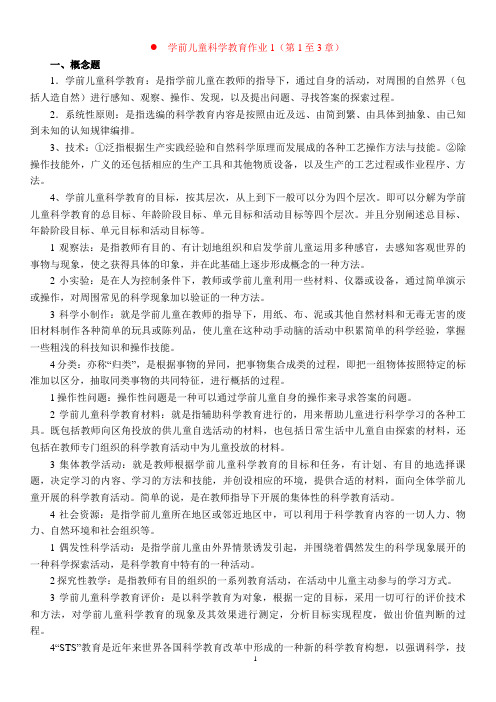
学前儿童科学教育作业1(第1至3章)一、概念题1.学前儿童科学教育:是指学前儿童在教师的指导下,通过自身的活动,对周围的自然界(包括人造自然)进行感知、观察、操作、发现,以及提出问题、寻找答案的探索过程。
2.系统性原则:是指选编的科学教育内容是按照由近及远、由简到繁、由具体到抽象、由已知到未知的认知规律编排。
3、技术:①泛指根据生产实践经验和自然科学原理而发展成的各种工艺操作方法与技能。
②除操作技能外,广义的还包括相应的生产工具和其他物质设备,以及生产的工艺过程或作业程序、方法。
4、学前儿童科学教育的目标,按其层次,从上到下一般可以分为四个层次。
即可以分解为学前儿童科学教育的总目标、年龄阶段目标、单元目标和活动目标等四个层次。
并且分别阐述总目标、年龄阶段目标、单元目标和活动目标等。
1观察法:是指教师有目的、有计划地组织和启发学前儿童运用多种感官,去感知客观世界的事物与现象,使之获得具体的印象,并在此基础上逐步形成概念的一种方法。
2小实验:是在人为控制条件下,教师或学前儿童利用一些材料、仪器或设备,通过简单演示或操作,对周围常见的科学现象加以验证的一种方法。
3科学小制作:就是学前儿童在教师的指导下,用纸、布、泥或其他自然材料和无毒无害的废旧材料制作各种简单的玩具或陈列品,使儿童在这种动手动脑的活动中积累简单的科学经验,掌握一些粗浅的科技知识和操作技能。
4分类:亦称“归类”,是根据事物的异同,把事物集合成类的过程,即把一组物体按照特定的标准加以区分,抽取同类事物的共同特征,进行概括的过程。
1操作性问题:操作性问题是一种可以通过学前儿童自身的操作来寻求答案的问题。
2学前儿童科学教育材料:就是指辅助科学教育进行的,用来帮助儿童进行科学学习的各种工具。
既包括教师向区角投放的供儿童自选活动的材料,也包括日常生活中儿童自由探索的材料,还包括在教师专门组织的科学教育活动中为儿童投放的材料。
3集体教学活动:就是教师根据学前儿童科学教育的目标和任务,有计划、有目的地选择课题,决定学习的内容、学习的方法和技能,并创设相应的环境,提供合适的材料,面向全体学前儿童开展的科学教育活动。
福师20春《学前儿童科学教育》在线作业一答案_

(单选题)1: 在观察前依据所需观察的目标制定观察核对表,调查者根据观察到的事件或行为,对照表中的各项目逐条检核,并在符合的条目上做出记号并进行评定的是
A: 观察核对
B: 行为核对
C: 观察评价
D: 行为评价
正确答案: B
(单选题)2: 维持儿童科学探索过程的动力是()。
A: 充足的物质材料
B: 自然环境
C: 心理环境
D: 良好的心理环境
正确答案: D
(单选题)3: 学前儿童正规性科学活动
A: 与其他类型完全不同的活动
B: 是儿童自己主动的学习活动
C: 儿童可自主选择学习材料的科学活动
D: 可自选活动时间
正确答案: B
(单选题)4: 下列不属于学前儿童科学教育环境的要素的是()。
A: 自然环境
B: 社会环境
C: 心理环境
D: 物质材料
正确答案: B
(单选题)5: 科学游戏旨在
A: 重复游戏中所伴随的科学现象
B: 探索科学现象之间的关系或解决问题
C: 获得新发现,掌握新知识
D: 通过游戏体现问题、任务或目的
正确答案: A
(单选题)6: 把一堆物品放在一起进行分类:黄瓜、罗卜都是蔬菜,苹果、红枣、梨都不是蔬菜,这是
A: 挑选分类
B: 二元分类
C: 感知分类
D: 多元分类
正确答案: B。
___《学前儿童科学教育》在线作业一答案

___《学前儿童科学教育》在线作业一答案C:阿拉伯数学家___D:英国物理学家___正确答案: D1.有一个孩子,他认识了猫。
有一次去了动物园后,他看到和猫体型相似的动物都称之为“猫”,这表明他对“猫”的概念还处于初级阶段。
2.探索活动的结果既是一次探索活动的结束,又是新的探索活动的开始。
3.儿童科学实验的内容是生活中常见的,基于儿童原有的知识和经验,设备和条件简单,可就近取材,实验操作技术简单,要求不高。
4.非正规性科学活动仍然有具体的目标和计划,不属于其特点。
5.创造精神是幼儿发展评价指标之一。
6.正规性科学活动、非正规性科学活动和偶发性科学活动的共同之处在于它们都是儿童自己的科学探索活动。
7.偶发性科学活动是活动过程中随机性最强,最容易受外界因素干扰的。
8.探索过程是幼儿学科学的核心要素。
9.实验法不属于学前儿童科学教育中常用的评价方式。
10.在儿童学科学的环境要素中,心理环境是一种看不见的要素。
11.科学游戏旨在重复游戏中所伴随的科学现象。
12.首创用实验法进行科学教学的是英国物理学家___。
有一个儿童,他学会了认识猫。
有一次去了动物园后,他将所有体型类似于猫的动物都称为猫。
这表明他在头脑中形成了初级的科学概念。
幼儿科学教育活动所实现的教育价值并不是单方面的,它不仅可以促进幼儿科学知识的研究,还可以培养幼儿的观察、实验、探究和解决问题的能力,提高幼儿的思维能力和创造性思维能力。
利用谜语、儿歌、故事等导入活动可以吸引幼儿的兴趣,将他们的注意力集中到将要研究和探索的事物上,从而更好地开展科学教育活动。
幼儿在研究科学的过程中,通过探索发现和实践操作,可以提高他们的再造创造水平,从而促进幼儿的全面发展。
能按照事物内在的、物理特性进行分类是5-6岁幼儿科学教育的目标,这可以培养幼儿的分类思维和逻辑思维能力。
科学技术的功能包括认识功能、生产力功能和社会管理功能,它们都对人类社会的发展起到了重要的作用。
《学前儿童科学教育》形考作业及参考答案4.doc
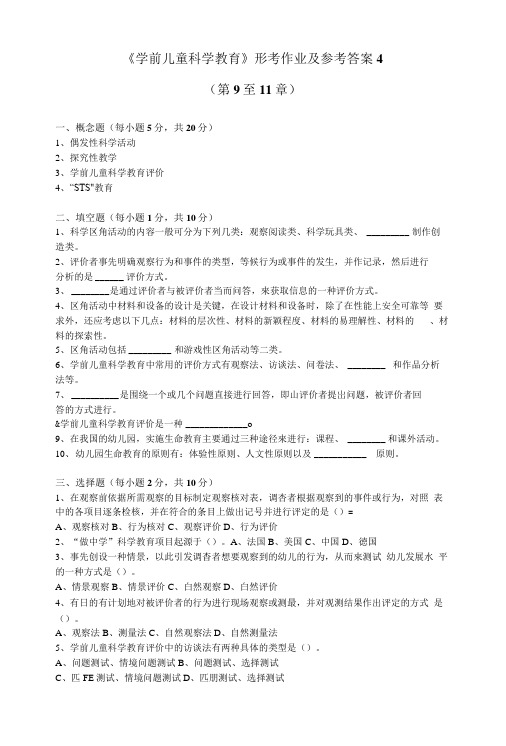
《学前儿童科学教育》形考作业及参考答案4(第9至11章)一、概念题(每小题5分,共20分)1、偶发性科学活动2、探究性教学3、学前儿童科学教育评价4、“STS"教育二、填空题(每小题1分,共10分)1、科学区角活动的内容一般可分为下列几类:观察阅读类、科学玩具类、 _________ 制作创造类。
2、评价者事先明确观察行为和事件的类型,等候行为或事件的发生,并作记录,然后进行分析的是______ 评价方式。
3、________ 是通过评价者与被评价者当而问答,來获取信息的一种评价方式。
4、区角活动中材料和设备的设计是关键,在设计材料和设备时,除了在性能上安全可靠等要求外,还应考虑以下几点:材料的层次性、材料的新颖程度、材料的易理解性、材料的、材料的探索性。
5、区角活动包括_________ 和游戏性区角活动等二类。
6、学前儿童科学教育中常用的评价方式有观察法、访谈法、问卷法、 ________ 和作品分析法等。
7、__________ 是围绕一个或几个问题直接进行回答,即山评价者提岀问题,被评价者回答的方式进行。
&学前儿童科学教育评价是一种_____________ o9、在我国的幼儿园,实施生命教育主要通过三种途径來进行:课程、 ________ 和课外活动。
10、幼儿园生命教育的原则有:体验性原则、人文性原则以及___________ 原则。
三、选择题(每小题2分,共10分)1、在观察前依据所需观察的目标制定观察核对表,调杏者根据观察到的事件或行为,对照表中的各项目逐条检核,并在符合的条目上做出记号并进行评定的是()=A、观察核对B、行为核对C、观察评价D、行为评价2、“做中学”科学教育项目起源于()。
A、法国B、美国C、中国D、徳国3、事先创设一种情景,以此引发调杳者想要观察到的幼儿的行为,从而來测试幼儿发展水平的一种方式是()。
A、情景观察B、情景评价C、白然观察D、白然评价4、有日的有计划地对被评价者的行为进行现场观察或测最,并对观测结果作出评定的方式是()。
学前儿童科学教育作业及答案

学前儿童科学教育作业及答案Company number:【WTUT-WT88Y-W8BBGB-BWYTT-19998】学前儿童科学教育作业1(第1至3章)一、概念题1.学前儿童科学教育:是指学前儿童在教师的指导下,通过自身的活动,对周围的自然界(包括人造自然)进行感知、观察、操作、发现,以及提出问题、寻找答案的探索过程。
2.系统性原则:是指选编的科学教育内容是按照由近及远、由简到繁、由具体到抽象、由已知到未知的认知规律编排。
3、技术:①泛指根据生产实践经验和自然科学原理而发展成的各种工艺操作方法与技能。
②除操作技能外,广义的还包括相应的生产工具和其他物质设备,以及生产的工艺过程或作业程序、方法。
4、学前儿童科学教育的目标,按其层次,从上到下一般可以分为四个层次。
即可以分解为学前儿童科学教育的总目标、年龄阶段目标、单元目标和活动目标等四个层次。
并且分别阐述总目标、年龄阶段目标、单元目标和活动目标等。
1观察法:是指教师有目的、有计划地组织和启发学前儿童运用多种感官,去感知客观世界的事物与现象,使之获得具体的印象,并在此基础上逐步形成概念的一种方法。
2小实验:是在人为控制条件下,教师或学前儿童利用一些材料、仪器或设备,通过简单演示或操作,对周围常见的科学现象加以验证的一种方法。
3科学小制作:就是学前儿童在教师的指导下,用纸、布、泥或其他自然材料和无毒无害的废旧材料制作各种简单的玩具或陈列品,使儿童在这种动手动脑的活动中积累简单的科学经验,掌握一些粗浅的科技知识和操作技能。
4分类:亦称“归类”,是根据事物的异同,把事物集合成类的过程,即把一组物体按照特定的标准加以区分,抽取同类事物的共同特征,进行概括的过程。
1操作性问题:操作性问题是一种可以通过学前儿童自身的操作来寻求答案的问题。
2学前儿童科学教育材料:就是指辅助科学教育进行的,用来帮助儿童进行科学学习的各种工具。
既包括教师向区角投放的供儿童自选活动的材料,也包括日常生活中儿童自由探索的材料,还包括在教师专门组织的科学教育活动中为儿童投放的材料。
福师《学前儿童科学教育》在线作业

福师《学前儿童科学教育》在线作业一试卷总分:100 测试时间:-- 试卷得分:100单选题多选题判断题包括本科在内的各科复习资料及详细解析,可以联系屏幕右上的“文档贡献者”一、单选题(共20 道试题,共40 分。
)得分:40V 1. 下例动物中,适合学前儿童饲养的是A. 乌龟、金鱼、娇凤、蝌蚪B. 乌龟、金鱼、蝌蚪、蚕C. 蛇、金鱼、泥鳅、蝌蚪D. 乌龟、甲鱼、娇凤、蚕。
满分:2 分得分:22. 科学的范畴极为广泛,我们把科学定义为:科学是关于A. 自然、思维和人类的知识体系B. 思维、天然和社会的知识体系C. 自然、社会和人类的知识体系D. 思维、自然和社会的知识体系。
满分:2 分得分:23. 世界上首创用实验法进行科学教学的是A. 孟子B. 墨子C. 老子D. 孔子。
满分:2 分得分:24. ()是“人造”的自然,是科学技术应用于社会生活的具体体现;A. 水、阳光、空气等B. 木、石、土等C. 电脑、宇宙飞船、拖拉机、电冰箱等D. 鸡、鸭、羊、狗等。
满分:2 分得分:25. 在幼儿园里开展的“听声音、猜东西”、“气味真正多”、“小小品尝会”等活动,是有关什么的探索()。
A. 人体的结构、功能及保护B. 人的心理活动C. 个体的生命过程D. 感受、体验人体内部主要器官的活动和功能。
满分:2 分得分:26. 不属于学前儿童科学教育中常用的评价方式是A. 观察法B. 问卷法C. 实验法D. 作品分析法。
满分:2 分得分:27. 幼儿园科学教育评价是一种什么样的系统,可以用来判定科学教育过程中的每一个步骤是否有效,并采取相应的措施,以确保科学教育的质量:A.督导——反馈系统B. 评价——督导系统C. 反馈——校正系统D. 校正——督导系统。
满分:2 分得分:28. 对于学前儿童来说,他们的科学知识有两个层次,即:A. 科学经验和初级科学概念B. 感性的知识和理性的知识C. 初级经验和高级经验D. 具体的经验和抽象的经验。
福建师范大学智慧树知到“学前教育”《学前儿童科学教育》网课测试题答案卷3
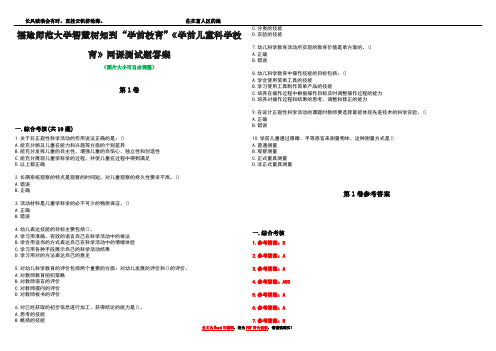
福建师范大学智慧树知到“学前教育”《学前儿童科学教育》网课测试题答案(图片大小可自由调整)第1卷一.综合考核(共10题)1.关于非正规性科学活动的作用说法正确的是:()A.能充分顾及儿童在能力和兴趣等方面的个别差异B.能充分发挥儿童的自主性,增强儿童的自信心、独立性和创造性C.能充分展现儿童学科学的过程,并使儿童在过程中得到满足D.以上都正确2.长期系统观察的特点是观察的时间短,对儿童观察的持久性要求不高。
()A.错误B.正确3.活动材料是儿童学科学的必不可少的物质保证。
()A.正确B.错误4.幼儿表达技能的目标主要包括()。
A.学习用准确、有效的语言自己在科学活动中的做法B.学会用适当的方式表达自己在科学活动中的情绪体验C.学习用各种手段展示自己的科学活动结果D.学习用对的方法表达自己的意见5.对幼儿科学教育的评价包括两个重要的方面:对幼儿发展的评价和()的评价。
A.对教师教育组织策略B.对教师语言的评价C.对教师提问的评价D.对教师板书的评价6.对已经获取的初步信息进行加工、获得结论的能力是()。
A.思考的技能B.概括的技能C.分类的技能D.实验的技能7.幼儿科学教育活动所实现的教育价值是单方面的。
()A.正确B.错误8.幼儿科学教育中操作技能的目标包括:()A.学会使用简单工具的技能B.学习使用工具制作简单产品的技能C.培养在操作过程中根据操作目标及时调整操作过程的能力D.培养对操作过程和结果的思考、调整和修正的能力9.在设计正规性科学活动的课题时教师要选择最能体现先进技术的科学实验。
()A.正确B.错误10.学前儿童通过眼睛、手等感官来测量物体,这种测量方式是()A.普通测量B.观察测量C.正式量具测量D.非正式量具测量第1卷参考答案一.综合考核1.参考答案:D2.参考答案:A3.参考答案:A4.参考答案:ABC5.参考答案:A6.参考答案:A7.参考答案:B8.参考答案:ABCD9.参考答案:B10.参考答案:B。
学前儿童科学教育作业答案1
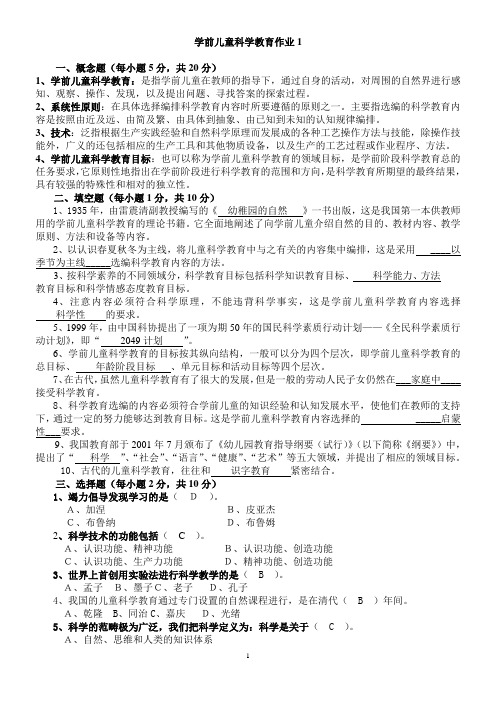
学前儿童科学教育作业1一、概念题(每小题5分,共20分)1、学前儿童科学教育:是指学前儿童在教师的指导下,通过自身的活动,对周围的自然界进行感知、观察、操作、发现,以及提出问题、寻找答案的探索过程。
2、系统性原则:在具体选择编排科学教育内容时所要遵循的原则之一。
主要指选编的科学教育内容是按照由近及远、由简及繁、由具体到抽象、由已知到未知的认知规律编排。
3、技术:泛指根据生产实践经验和自然科学原理而发展成的各种工艺操作方法与技能,除操作技能外,广义的还包括相应的生产工具和其他物质设备,以及生产的工艺过程或作业程序、方法。
4、学前儿童科学教育目标:也可以称为学前儿童科学教育的领域目标,是学前阶段科学教育总的任务要求,它原则性地指出在学前阶段进行科学教育的范围和方向,是科学教育所期望的最终结果,具有较强的特殊性和相对的独立性。
二、填空题(每小题1分,共10分)1、1935年,由雷震清副教授编写的《幼稚园的自然》一书出版,这是我国第一本供教师用的学前儿童科学教育的理论书籍。
它全面地阐述了向学前儿童介绍自然的目的、教材内容、教学原则、方法和设备等内容。
2、以认识春夏秋冬为主线,将儿童科学教育中与之有关的内容集中编排,这是采用 ____以季节为主线_____选编科学教育内容的方法。
3、按科学素养的不同领域分,科学教育目标包括科学知识教育目标、科学能力、方法____教育目标和科学情感态度教育目标。
4、注意内容必须符合科学原理,不能违背科学事实,这是学前儿童科学教育内容选择____科学性____的要求。
5、1999年,由中国科协提出了一项为期50年的国民科学素质行动计划——《全民科学素质行动计划》,即“2049计划”。
6、学前儿童科学教育的目标按其纵向结构,一般可以分为四个层次,即学前儿童科学教育的总目标、年龄阶段目标、单元目标和活动目标等四个层次。
7、在古代,虽然儿童科学教育有了很大的发展,但是一般的劳动人民子女仍然在___家庭中____接受科学教育。
- 1、下载文档前请自行甄别文档内容的完整性,平台不提供额外的编辑、内容补充、找答案等附加服务。
- 2、"仅部分预览"的文档,不可在线预览部分如存在完整性等问题,可反馈申请退款(可完整预览的文档不适用该条件!)。
- 3、如文档侵犯您的权益,请联系客服反馈,我们会尽快为您处理(人工客服工作时间:9:00-18:30)。
A.错误 B.正确
4.教师在回答幼儿的提问时,通过激发幼儿的想象力,促使他们联想更多的事物的回答方式是:引 发回忆式 A.错误 B.正确
5.幼儿在学科学的过程中的探索发现并不属于再造的创造水平 A.错误 B.正确
6.观察是儿童认识世界的一种基本方法 A.错误 B.正确
误 B.正确
6.幼儿表达技能的目标主要包括: A.学习用准确、有效的语言自己在科学活动中的做法 B.学会用适当的方式表达自己在科学活动中的情绪体验 C.学习用各种手段展示自己的科学活动结果 D.学习用对的方法表达自己的意见
7.在教育实践中,幼儿科学教育内容的科学性和启蒙性应体现在: A.选择儿童可以直接探索的内容 B.结合儿童的生活向儿童介绍现代的先进科学技术 C.让儿童通过自己直接的探索活动 D.选择儿童可以理解的内容
8.幼儿科学教育情感目标要包括以下几个方面: A.鼓励幼儿对于自然和科学现象有好奇心 B.启发幼儿热爱自然,爱护环境 C.培养儿童对科学技术及其对社会的作用的关注 D.完善儿童的知识体系
9.当前幼儿科学教育的内容,主要包括以下几个方面: A.科学技术教育 B.自然科学现象 C.自然生态环境 D.人体
2.正规性科学活动的设计包括: A.活动课题的设计 B.活动目标的设计 C.活动材料的设计 D.活动过程的设计
3.幼儿科学教育内容选择的首要要求是: A.科学性 B.广泛性 C.时代性 D.启蒙性
4.幼儿学科学的要素包括: A.探索态度 B.探索对象
C.探索过程 D.探索结果
5.幼儿阶段应学习的科学探索技能包括: A.观察 B.分类 C.思考 D.实验
8.幼儿爱向成人提出各种有关自然界的问题,他们问“月亮为什么是圆的?”,这类问题属于直白性 问题 A.错误 B.正确
9.正规性科学活动是要求全体儿童都必须参与的科学活动 A.错误 B.正确
10.从各种水果、蔬菜、花卉中挑选出水果来,这种分类是感知分类 A.错误 B.正确
16.事先创设一种情景,以此引发调查者想要观察到的幼儿的行为,从而来测试幼儿发展水平的一种 方式是 A.情景观察 B.情景评价
C.自然观察 D.自然评价
17.各年龄段进行比较性观察时要求有所不同,比较物体明显不同点的要求应主要放在 A.2~3岁 B.3~4岁 C.4~5岁 D.5~6岁
18.下列不属于评价幼儿科学探究能力的是:() A.求实与批判精神 B.记录和统计有关的信息 C.发现关系的能力 D.探究的倾向性和深度
10.科学游戏旨在: A.重复游戏中所伴随的科学现象 B.探索科学现象之间的关系或解决问题 C.获得新发现,掌握新知识 D.通过游戏体现问题、任务或目的
11.下例动物中,适合学前儿童饲养的是 A.乌龟、金鱼、娇凤、蝌蚪 B.乌龟、金鱼、蝌蚪、蚕 C.蛇、金鱼、泥鳅、蝌蚪 D.乌龟、甲鱼、娇凤、蚕
12.渗透的学前儿童科学教育活动包括 A.日常生活中的科学教育、游戏活动中的科学教育、偶发性的科学教育 B.集体性的科学教育、游戏活动中的科学教育、其它教育活动中的科学教育 C.日常生活中的科学教育、偶发性的科学教育、其它教育活动中的科学教育 D.日常生活中的科学教育、游戏活动中的科学教育、其它教育活动中的科学教育
福师《学前儿童科学教育》在线作业一 红字部分为答案!
单选题 1.下列不属于电教媒体的特点的是 A.具有直接性 B.具有媒体的多样性 C.具有时空宽广性 D.具有形象生动性
2.在儿童学科学的诸要素中,儿童学科学的动力是: A.探索对象 B.探索态度 C.探索过程 D.探索结果
3.在儿童学科学的诸要素中,幼儿学科学的物质前提是 A.探索态度 B.探索对象 C.探索过程 D.探索结果
4.儿童在科学探索活动中所表现出来的认识和情绪倾向是()。 A.探索情绪 B.探索好奇心 C.探索意识 D.探索态度
5.科学教育的最终目的是()。 A.获取丰富的科学经验 B.培养对科学的好奇心 C.培养儿童真善美的完美个性 D.培养学科学的方法
6.幼儿爱向成人提出各种有关自然界的问题,他们问“月亮为什么是圆的?”,这类问题属于 A.简朴性问题 B.操作性问题 C.理论性问题 D.直白性问题
13.正规性科学活动、非正规性科学活动和偶发性科学活动的共同之处在于: A.都是儿童自己的科学探索活动 B.都有固定的场所 C.都是儿童主动地选择材料 D.都需要教师的直接指导
14.在正规性科学活动结束时,设计要充分体现: A.互动性 B.封闭性 C.自主性 D.开放性
15.属于“人造”的自然,是科学技术应用于社会生活的体现的是; A.水、阳光、空气等 B.木、石、土等 C.电脑、飞机、电脑、汽车等 D.鸡、鸭、羊、狗等
7.维持儿童科学探索过程的动力是()。 A.充足的物质材料 B.自然环境 C.心理环境 D.良好的心理环境
8.下列属于幼儿园可做的物理小实验的是: A.变色花”实验 B.种子发芽实验
C.蚯蚓翻土实验 D.摩檫实验
9.长期系统性观察主要在哪个年龄段进行 A.2~3岁 B.3~4岁 C.4~5岁 D.5~6岁
19.各年龄阶段进行比较性观察时要求有所不同,5-6岁年龄班的要求是 A.比较物体明显的不同点 B.比较物体的不同点 C.比较物体的相同点 D.比较物体的不同点和相同点
20.以下物品中可以作为学前儿童自然测量工具的是 A.绳子 B.秤 C.直尺 D.钟表
多选题 1.幼儿科学教育的内涵应包括: A.引导幼儿主动学习、主动探索的过程 B.支持幼儿亲身经历探究过程、体验科学精神的过程 C.使幼儿获得有关周围物质世界及其关系的感性认识和经验的过程。 D.支持幼儿亲身探究解决问题策略的过程
10.正规性科学活动的活动准备工作包括: A.活动经费的准备 B.情感的准备 C.时间的准备 D.空间环境的准备
判断题 1.幼儿科学教育的总目标是实施幼儿科学教育的根本指导和方向 A.错误 B.正确
2.教师对于科学的关心和主动态度可以极大地感染幼儿,促使幼儿好奇心的产生和发展 A.错误 B.正确
3.种植和饲养、散步和采集也是幼儿进行科学探索的一般方法
